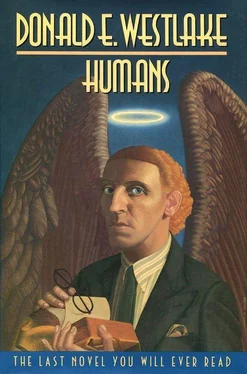“Invitation?” Grigor half turned, to put the envelope in the light, and saw it was nearly square, made of heavy cream-toned paper, and blank. An exterior envelope with stamps and name and address must have been discarded. Inside this envelope was a card of nearly the same size, which made it hard for Grigor to slide it out. When he did, he saw it was indeed an invitation, printed in flowery script, addressed to no one in particular — “You are invited...” — and done in two languages: next to the familiar Cyrillic script, the same sentiments appeared in Roman script, in English.
The invitation was to a soiree (“cocktail party” in the English) tomorrow evening — well, no, this evening — at the Hotel Savoy, one of the two or three first-class hotels in this classless city. (They accepted foreign hard currency only, no roubles.) The group extending the invitation was the International Society for Cultural Preservation.
Grigor frowned at this document. “I don’t understand.”
“They sent it to me,” the man said, with a sad smile, “because of what I used to do.”
Ah. Everyone here at the clinic used to do something, of course, all different kinds of somethings; not all were former firemen. And not all had found a new career, like Grigor’s joke-writing, to take the place of the old. Because so many of the residents found it painful to be reminded that they could no longer do whatever it was that used to occupy their minds and their days, the subject was informally agreed to be taboo. No one would ever ask a fellow resident about his or her former occupation. So Grigor couldn’t pursue that topic, but had to say instead, “Then why don’t you go yourself?”
“I’ve been a little low lately,” the man said.
Another forbidden subject. Every resident of the clinic was doomed to die, and soon rather than late, but not all of them at the same pace or in the same way or to the same final date. Complaining about one’s lot or describing one’s horrible symptoms to other residents would be the height of insensitivity; the person you’re talking to could very easily be in worse shape than you. So euphemisms had developed, and were generally understood, and they served to make conversation more palatable, even more possible. “I’ve been a little low lately,” was universally taken to mean that one’s particular illness had just moved into a further and more debilitating phase, that another step on one’s own staircase down into the dark had just been reached, and that the victim had not yet adapted.
So once again Grigor couldn’t pursue a topic. Frowning at the invitation — the International Society for Cultural Preservation — he said, “Who are these people?”
“They try to raise money,” the man said, “to restore and preserve great works of art. Around the world, you know, the accomplishments of civilization are being destroyed, mostly by man. Acid rain, deliberate destruction by builders, changes in the quality of our sunlight, in many ways human art is being made to disappear. Stone statues melt in this air, motion pictures fade, paintings rot, books crumble, archaeological sites are plundered for trinkets to sell to the nouveau riche—”
Grigor laughed; he couldn’t help himself. “All right, all right, I get the idea. These are do-gooders.”
“They try.” The man shrugged.
Grigor looked again at the invitation. “Raise money,” he echoed. “From me?”
“Oh, no, no. This is a promotional party, that’s all. These people are trying to get our government interested in their work.”
“They’re Americans?”
“English, I think, at first. They have members all over the world now.” Again the man shrugged. “For what good it does.”
Surprised, Grigor said, “You don’t believe they’re doing any good?”
“Oh, some,” the man said. “Some small victories, here and there. But you know it’s said, ‘Rust never sleeps.’” Then, more forcefully, he said, “And why try at all to save anything? It’s coming to an end, anyway, isn’t it?”
“Is it?”
“Of course! We’re doing our best to destroy ourselves and our history and even our planet! Grigor, look at all of us in here. Why are we here ?”
Now it was Grigor’s turn to shrug. He’d gone past that question a long time ago. “Mistakes were made,” he said.
“We’re moving into a world of mistakes,” the man told him, then waved his hand in a dismissing gesture. “Let it all go. It’s spoiled anyway.”
Ah, well; Grigor knew that attitude intimately. Why should the rest of the world go on as though nothing had happened, when I am in here , with this ? The ones like Grigor without strong family ties were the most subject to this sort of feeling, but it reached everyone from time to time. There was no answering that attitude, of course, no particular reason why life should go on without Grigor, or any of the other residents; one simply waited for the feeling to go away, and it almost always did. But no one talked about it; that this man expressed it in words showed just how badly he’d been affected by the “low” he’d mentioned.
In any event, the issue was this invitation. Shaking his head, Grigor said “I don’t see what this has to do with me. Why should I go to this thing?”
“Because you’d enjoy it,” the man said. “And you’d get ideas for jokes there, I know you would. And you speak English.”
“Oh, well, not really.” Grigor dismissed that by waving the hand with the invitation in it. “I studied English in school, I can read it, but to talk...”
“Then this is a chance to improve your English,” the man said.
“For what?” Grigor smiled at the thought. “To make up jokes for Americans?”
“For its own sake,” the man said, and gestured at the invitation. “Take it, Grigor. Go or don’t go, it’s up to you. Excuse me, I don’t like to stand this long.”
“Yes, of course,” Grigor said, awkward as they all were when brought face-to-face with each other’s infirmities. Grigor was still much stronger than this man, which was a source of embarrassment. He nodded, and the man shuffled away down the hall, and Grigor shut the door.
Sitting on his bed, putting the invitation on the bedside table, Grigor suddenly yawned, massive and uncontrollable. The clock read four-fourteen, and Grigor was all at once so sleepy that the first time he reached for the button to switch off the light he missed. But then he got it, and in the darkness lay back on his pillow, his mind swirling with thoughts, none of them truly coherent.
Would he go to the do-gooders’ party? Which one of his fellow residents was that guy? And, since the rooms were deliberately soundproofed, how had he heard Grigor’s quiet alarm?
Grigor slept, and when he next awoke, for his eight A.M. pill, he remembered all those questions except the last one.
Approaching the broad steps leading up to the entrance to the Savoy Hotel, Grigor was almost painfully aware of how he looked. A thin man in his early thirties, with a gaunt face made even more lean by the loss of a few back teeth (they’d become too loose in their gums to be saved), with dry brown hair that had grown back more spottily than before, and with a measured slowness to his pace caused by the steady draining away of his vigor, he knew his appearance was gloomy and boring, like some sort of country bumpkin. The good suit, the silk tie, the heavy expensive well-shined shoes, all bought with Boris Boris’s money, were like a hasty disguise, as though he were a prisoner on the run. But above all, approaching the refurbished and highly polished Savoy entrance, aware of the cool calculation in the eyes of the doorman up there watching him slowly mount the steps, above all else Grigor knew he looked Russian. And the wrong sort of Russian to be coming to the Savoy Hotel.
Читать дальше






